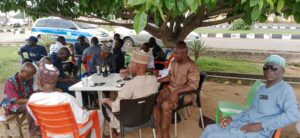

By Dad Ahmed.
Monday, July 1, 2024, will be etched into the annals of journalism in Kogi State, as members of the state council of the Nigeria Union of Journalists (NUJ) and other members of the other professions gathered at a popular recreational spot in Lokoja to celebrate one of their own, Mr. Yusuf Jimoh Itopa.
While such gatherings are not unprecedented, the sheer turnout of journalists and members of the public made this occasion particularly noteworthy.
Beyond expressing their solidarity with Itopa, recently appointed Managing Director and CEO of the state-owned Graphic newspaper, journalists seized the opportunity to unwind and discuss how their profession could contribute more effectively to Kogi State’s development through better information dissemination.
Itopa, a seasoned journalist with a successful tenure at the Graphic, received his appointment from the State Head of Service, Pst. Elijah Evinemi. In his address, Evinemi called upon Itopa to justify the confidence placed in him by the state and its citizens.
Itopa, visibly moved by the show of solidarity and camaraderie, exchanged pleasantries with colleagues amid an atmosphere of conviviality.
Reflecting on the event, some journalists affirmed that their unity demonstrated a commitment to supporting one another, believing that strengthened solidarity could significantly enhance their efforts towards Kogi’s development.
Media experts define developmental journalism as a specialized form of reporting that not only informs but actively promotes societal progress. It focuses on issues such as economic growth, social justice, governance, infrastructure development, and overall community welfare.
Experts argue that Kogi State, like many others in Nigeria, faces significant developmental challenges. They emphasize that developmental journalism can play a pivotal role in raising awareness about these challenges, advocating for solutions, and fostering accountability and transparency in governance.
They stress the importance of empowering communities by providing them with essential information for informed decision-making and encouraging citizen participation in governance processes.
Furthermore, developmental journalists are seen as crucial in monitoring the implementation of government policies and projects, ensuring resources are used efficiently, and evaluating their impact on communities.
The recent gathering of Kogi journalists to celebrate Itopa’s appointment symbolizes not just a show of support but also a reaffirmation of their commitment to enhancing developmental journalism in the state. It is believed that their unity of purpose will serve as a catalyst for advocating development-oriented policies, promoting accountability, and fostering inclusive growth in Kogi.
But more importantly, information obtained from AI model language expert urges journalists in kogi to adopt the following attitude to achieve their aims and objectives in developmental journalism.
Amplifying Voices: Unified journalists can amplify important issues and stories that affect development in Kogi State.
By working together, they can ensure that critical issues like infrastructure development, healthcare, education, and governance receive consistent coverage and attention.
Increased Accountability: A unified front of journalists can hold government officials and institutions accountable for their actions or inaction regarding development projects and policies. This can lead to greater transparency and efficiency in governance.
Pooling Resources:Collaboration among journalists can lead to the sharing of resources such as information, contacts, and expertise. This can result in more in-depth investigations and well-rounded reporting on development-related issues.
Promoting Best Practices:Unity can foster the sharing of best journalistic practices among journalists in Kogi State. This includes ethical reporting, accurate fact-checking, and balanced reporting, which are crucial for gaining trust and credibility among the public and stakeholders.
Advocacy for Change: Unified journalists can act as advocates for positive change in Kogi State. They can highlight successful developmental initiatives, propose constructive solutions to challenges, and engage stakeholders to drive progress and improvement.
Building Public Awareness and Engagement: Through unified efforts, journalists can raise awareness among the public about the importance of development issues and encourage civic engagement. This can empower citizens to actively participate in decision-making processes and demand accountability from their leaders.
Resilience Against Challenges:A united front can also provide support and solidarity in facing challenges such as threats to press freedom or safety concerns for journalists. Collective action can strengthen their resilience and ability to continue reporting on critical issues without fear or bias.
In essence, unity among journalists in Kogi State can create a powerful platform for promoting developmental journalism, fostering positive change, and contributing to the overall progress and well-being of the state and its people.
In the final analysis,as stakeholders in Kogi State’s socio-economic and political landscape, journalists are poised to fulfill their role as information managers, leveraging their unity to contribute meaningfully to the development of the state.
Dada Ahmed is a journalist who publishes The Reporters.



